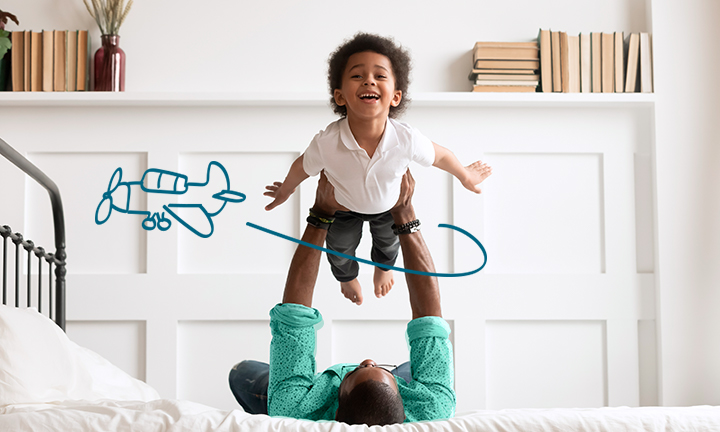
How Much Screen Time Is Too Much?
Key Takeaways
Nowadays, screens are a fixture in our lives from a young age. While technology offers great potential in terms of your child’s learning skills and development, a certain amount of constraint isn’t always a terrible idea. Read this article for more information on how to manage screen time.
Recommended Screen Time by Age
With so much information available on screen time, it can often be hard to work out how much is best for your child. While there are no official UK guidelines on screen time, the WHO recommends the following for children under 4 years old:
Infants and 1-year-olds
Sedentary screen time is not recommended (watching TV or videos, playing computer games). Under the age of 4 to 5 months, babies are not able to avert their gaze from the flickering light emitted by the screen, which can disrupt sleep if watched too close to bedtime. From 18 months, limited amounts of high quality TV content are OK, provided the child is supervised.
Children aged 2 to 4 years old
Ideally, it’s best to keep sedentary screen time to under 1 hour where possible; less is better. Research suggests that screen time shared with parents provides the most benefits for children.
How Screens Can Affect Your Child’s Development
Spending too much time in front of a screen can affect your little one’s development in a number of ways:
Too much screen time can also impact your little one’s language skills. Interacting with parents and other people in a child’s life is a key way in which children learn to talk and communicate during infancy. These interactions later develop into conversations, which allow children to make themselves heard and communicate what they’re feeling. Watching screens too much can limit the number of interactions a child has, in turn restricting their social skills. That’s not to say it’s all bad. With access to a device, small children, even infants, can now benefit from immersive experiences through touch screens, games and videos. Something which can have major potential for their learning skills and psychological growth.
Making the Most of Screen Time
With screens now an almost necessary part of life, you may be wondering how to help your little one get the best out of their screen time. There are a number of ways you can transform time in front of the screen into an educational, enriching experience for your child.
Tips for Managing Screen Time
Just like adults, children can find screen time so compelling that they may start losing interest in other activities. In this case, you may want to try limiting screen time to restrict any negative influences. Here are some tips on how to manage screen time:
Keeping Your Child Safe Online
As your little one grows into a toddler, he or she may start browsing the internet during his or her screen time. It’s important that things are in place to keep your child safe online. Here are a couple of things you can do to protect your child on the internet:
FAQS AT A GLANCE
There are no official UK guidelines on how much screen time is recommended for kids. Ideally, try to aim for as little as possible. You might like to try encouraging your child to participate in other activities like playing outside, reading, having conversations and doing craft activities as an alternative.
The Bottom Line
While allowing internet access and screen time can benefit your little one in certain ways, it’s not a necessary part of life for young children. Face-to-face contact and play with their parents and family are far more important. When your little one grows into a toddler, limiting screen time is still a good way to help your child’s physical and social development. If you’re looking for an alternative to screen time, check out our lists of baby games and craft activities for toddlers for inspiration.
- WHO: To grow up healthy, children need to sit less and play more
- NHS: Making the most of screen time
- NHS: Screen time
- NHS: Technology – how to get the balance right
- NHS: Screen time leaflet
- NHS: Under 5s using the internet
- NHS: Screen sense
- NHS: Your toddler’s sleep at...1-2 years
- NHS: Physical activity (1-3 years)
Read more about Toddler
Join Pampers Club and get:











